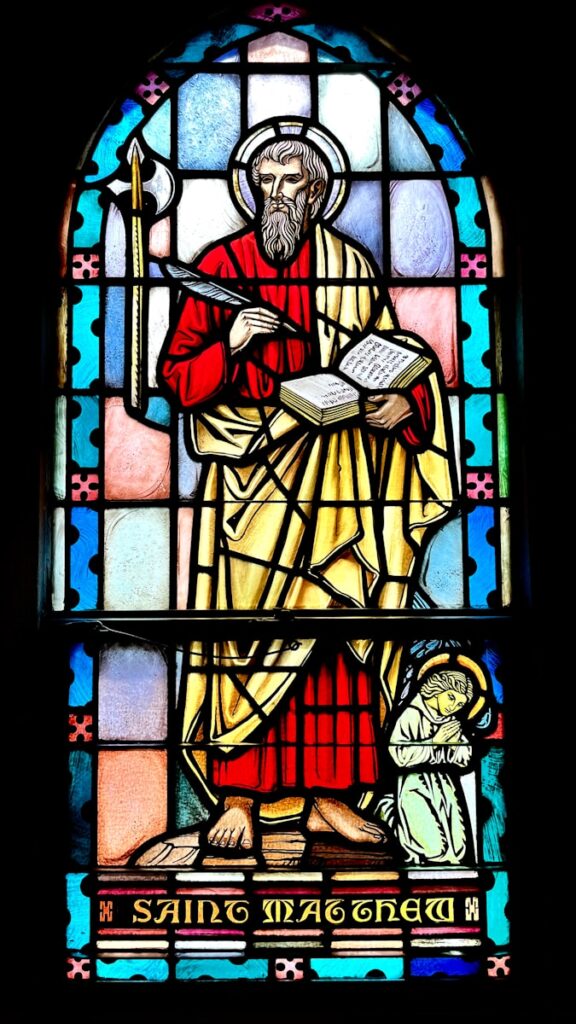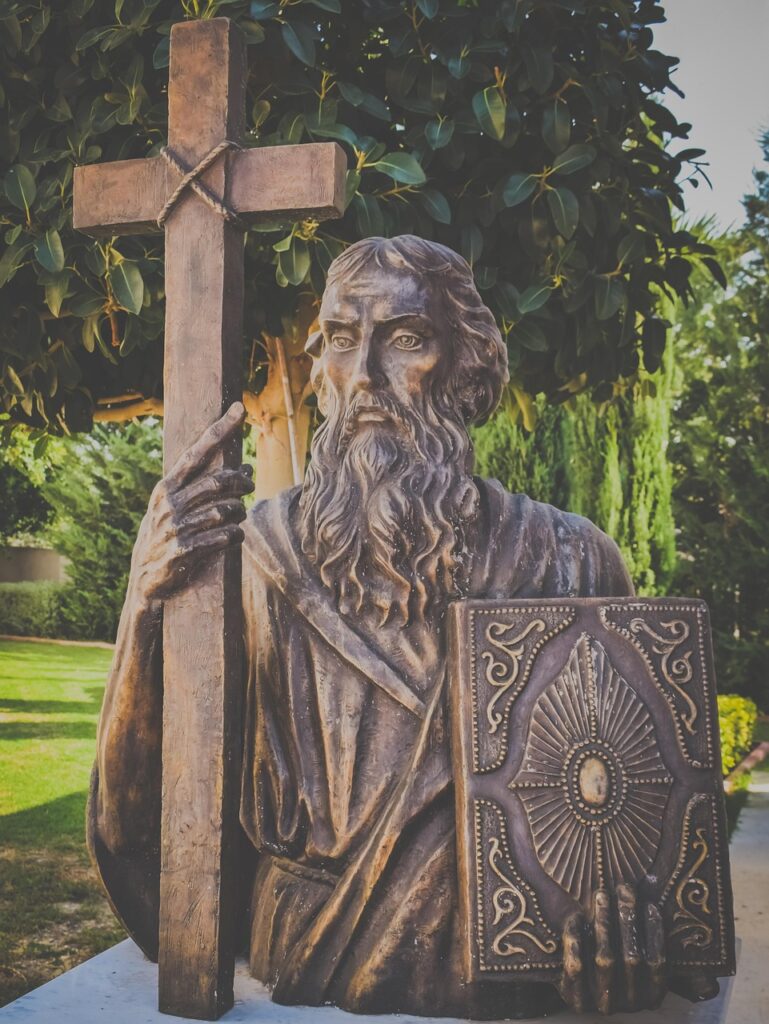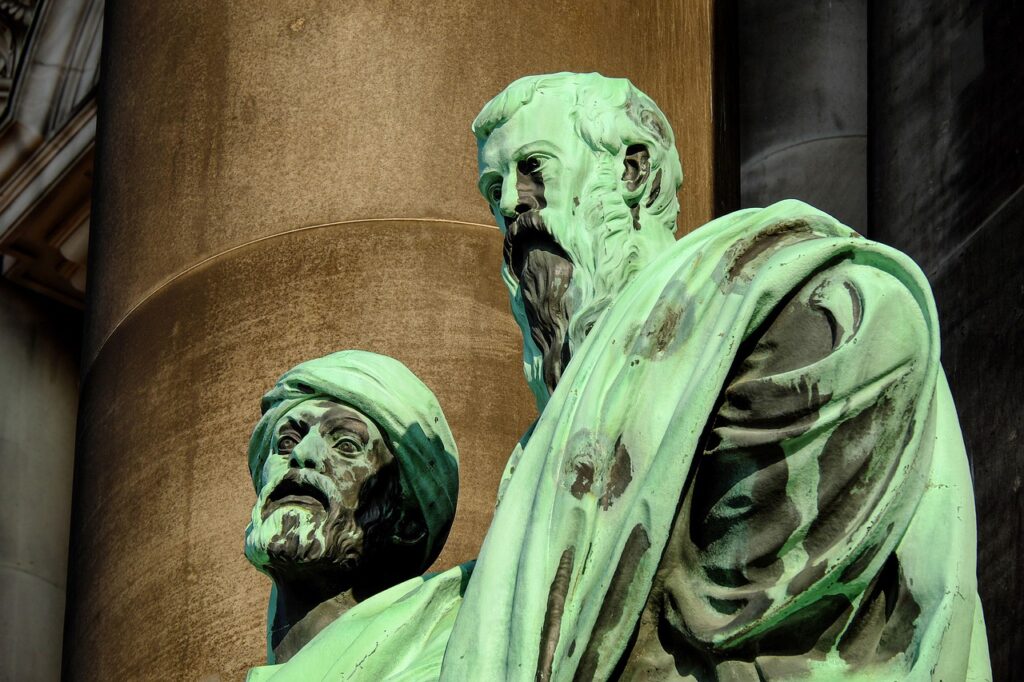
In a world constantly pulling us in countless directions, many of us seek anchors – guiding lights that help us stay true to ourselves, our values, and our purpose. We yearn for a sense of grounding, a deep-seated conviction that allows us to navigate life’s complexities with resilience and grace. While modern life often encourages us to look for quick fixes or trending self-help gurus, sometimes the most profound wisdom comes from unexpected places, from stories steeped in antiquity that continue to resonate with timeless truths.
Today, we embark on a fascinating journey back in time, to explore the life of a figure whose transformative path offers remarkable insights into what it truly means to live a grounded existence. This isn’t about fleeting trends or celebrity anecdotes; it’s about the deep-seated principles exemplified by Matthew the Apostle, a man whose radical change of direction and unwavering commitment to his calling provides a powerful blueprint for anyone striving for a more meaningful and purposeful life. His story, deeply rooted in faith and conviction, serves as a compelling narrative for personal growth and spiritual fortitude.
Through his experiences, we uncover how embracing change, acting with conviction, and dedicating oneself to a higher purpose can create an unshakeable foundation for our lives. Join us as we reflect on the incredible journey of Matthew, a man whose legacy continues to inspire millions to find their own path to being truly grounded, not just in external circumstances, but in the very core of their being. His insights, though ancient, feel remarkably relevant for the contemporary search for inner peace and direction.
1. **Matthew’s Transformative Calling: From Tax Collector to Apostle**Imagine a life where your profession, though perhaps financially secure, alienated you from your community. This was the reality for Matthew, who, before his encounter with Jesus, was known as a tax collector. In the social fabric of his time, tax collectors were often viewed with disdain, seen as collaborators with foreign powers and extracting duties that made them unpopular figures. His role at the “receipt of custom” in Capernaum was not merely a job; it was a societal marker that often came with significant social isolation and disapproval, positioning him on the fringes.
Yet, it was in this very setting, amidst the daily grind of his reviled profession, that a moment of profound transformation occurred. The New Testament recounts this pivotal instance: “Matthew is mentioned in Matthew 9:9 and Matthew 10:3 as a tax collector… who, while sitting at the ‘receipt of custom’ in Capernaum, was called to follow Jesus.” This simple, direct invitation from Jesus cut through all the societal judgments and expectations, offering Matthew an entirely new path, one that promised not just a change of career, but a complete reorientation of his life’s purpose and identity.
This calling wasn’t just an invitation; it was a radical affirmation of worth and potential. For Matthew, it meant stepping away from a life that, despite its material benefits, was spiritually and socially taxing. His willingness to abandon everything for an unknown future, guided only by faith in Jesus, serves as a powerful reminder that transformation is always possible, regardless of our past or perceived limitations. It challenges us to consider what old roles or identities we might be clinging to that prevent us from embracing a deeper, more authentic calling in our own lives.

2. **The Power of Following: Matthew’s Immediate Response to Jesus’ Call**What truly sets Matthew’s story apart is not just the calling itself, but his immediate and unequivocal response. While Mark 2:14 and Luke 5:27 refer to Jesus’ calling of a tax collector named Levi, son of Alphaeus, the tradition of the Eastern Orthodox Church holds that Levi and Matthew were the same person, brothers to James, son of Alphaeus. Regardless of the name, the narratives consistently portray a swift and decisive commitment. Matthew didn’t hesitate; he didn’t ask for time to consider, to pack, or to consult. He rose and followed.
This immediate response is more than just an action; it’s a profound testament to the power of conviction and the courage to act on a deep inner knowing. In a world that often encourages endless deliberation and analysis paralysis, Matthew’s swift transition from tax collector to disciple exemplifies a radical trust in the path laid before him. It speaks volumes about the clarity of the call he received and his readiness to surrender his previous life for something infinitely more meaningful, even if the exact destination was yet unknown.
His choice offers us a powerful lesson in intentionality and presence. When a clear path or purpose presents itself, how often do we allow doubts, fears, or the comfort of the familiar to hold us back? Matthew’s story encourages us to cultivate an open heart and a ready spirit, to be attuned to those moments of inspiration or divine guidance that invite us to step into our true potential. His journey reminds us that sometimes, the most grounded decisions are those made with swift, wholehearted commitment to our deepest truths.

3. **A Life Dedicated to Proclamation: Preaching the Gospel in Judea**Matthew’s commitment didn’t end with his initial decision to follow Jesus. After Jesus’ ascension, the disciples, including Matthew, “withdrew to an upper room (Acts 1:10–14) (traditionally the Cenacle) in Jerusalem.” This wasn’t a retreat into isolation, but a period of refocusing and preparation for the monumental task ahead. From this spiritual epicenter, they “remained in and about Jerusalem and proclaimed that Jesus was the promised Messiah,” embarking on the foundational mission of the early Christian church.
Early Church Fathers, such as Irenaeus and Clement of Alexandria, provide further insight into Matthew’s immediate ministry. They relate that he “preached the gospel to the Jewish community in Judea, before going to other countries.” This localized focus demonstrates a methodical and deeply committed approach to sharing the message. He started where he was, within his familiar cultural and religious context, building a strong foundation for his future endeavors. This period in Judea was crucial, allowing him to solidify his understanding and effectively communicate the profound significance of Jesus to those who shared his heritage.
Matthew’s dedication to proclaiming the gospel within Judea before venturing further holds a valuable lesson for us today. It highlights the importance of grounding our efforts in our immediate surroundings, mastering our message, and building credibility within our own communities before attempting to expand our reach. His sustained effort to share his convictions, starting from his spiritual home, speaks to the power of consistent action and authentic communication in building a truly impactful life and legacy. It’s about nurturing our own garden before seeking to plant seeds in distant lands.

4. **Spreading the Message Far and Wide: Matthew’s Ministry Beyond Judea**While Matthew’s initial ministry was rooted in Judea, his vision and dedication extended far beyond its borders. The call to follow Jesus was not a call to remain static, but to embark on a dynamic journey of spiritual outreach. Ancient writers, though sometimes disagreeing on specific destinations, are almost unanimous in mentioning Ethiopia as a significant location for his post-Judea ministry. This willingness to cross geographical and cultural boundaries underscores his profound commitment to the mission he had embraced.
One compelling tradition, held by the Church, narrates Matthew’s impact in Ethiopia. While preaching there, he “converted, and then consecrated to God, Ephigenia of Ethiopia, the virgin daughter of King Egippus.” This particular anecdote highlights the personal and transformative power of his ministry, not merely in terms of abstract doctrine, but in its ability to inspire individual lives and shift cultural landscapes. Converting and consecrating a king’s daughter would have been an act of immense spiritual significance, demonstrating the depth of his influence and the resonance of his message in a new land.
Matthew’s courageous venture into new territories offers us an inspiring blueprint for expanding our own spheres of influence. It reminds us that our purpose might call us to step out of our comfort zones, to engage with diverse cultures, and to share our truths with an open heart. This willingness to embrace the unfamiliar, to adapt, and to make a meaningful impact in new environments, is a powerful aspect of living a truly grounded life—one that is not confined by self-imposed limits, but ever-expanding in its reach and positive contribution.

5. **The Ultimate Sacrifice: Matthew’s Martyrdom and Unwavering Faith**Matthew’s unwavering commitment to his faith and his ministry culminated in the ultimate sacrifice, a testament to the depth of his convictions. The tradition of his martyrdom, held by both the Catholic Church and the Orthodox Church, paints a powerful picture of courage in the face of immense pressure. When King Hirtacus, who succeeded King Egippus, sought to marry Ephigenia—whom Matthew had consecrated to God as a nun—Matthew fearlessly confronted him.
The apostle invited King Hirtacus to liturgy, where he “rebuked the king for lusting after the girl, as she was a nun and therefore was the bride of Christ.” This act of standing firm against a powerful ruler, prioritizing spiritual integrity over personal safety, is a profound display of his moral fortitude. Matthew’s willingness to speak truth to power, even when it carried dire consequences, exemplifies a rare and inspiring form of courage that resonates across centuries.
The enraged King Hirtacus, unable to sway Matthew, responded with violence, ordering his bodyguard “to kill Matthew who stood at the altar, making him a martyr.” This final act cemented Matthew’s legacy as a man whose faith was stronger than any earthly threat. His martyrdom serves as a poignant reminder that living a truly grounded life often means holding fast to our values, even when it demands immense personal cost. It teaches us about the profound strength that comes from an unshakeable inner compass and the readiness to defend what we believe in, no matter the challenges.
Read more about: From Publican to Prophet: Unpacking the Radical ‘New Role’ That Transformed Matthew the Apostle’s Destiny Forever!

6. **The Gospel of Matthew: A Testament to the Messiah**Beyond his personal journey and ultimate sacrifice, Matthew’s most enduring legacy is arguably the Gospel that bears his name. This foundational text, which early Church tradition unanimously attributes to the apostle Matthew, serves as a cornerstone of Christian faith and a profound historical document. It is not merely a collection of stories but a meticulously crafted narrative with a very specific and powerful purpose: to confirm Jesus’ identity as the long-awaited Messiah.
Matthew’s primary objective was “to prove to his Jewish readers that Jesus is their Messiah.” He achieved this by systematically demonstrating how Jesus’ life and ministry meticulously fulfilled the prophecies of the Old Testament. Unlike other Gospel writers, Matthew notably “includes nine proof texts unique to his Gospel” to emphatically drive home this central theme: Jesus is indeed the fulfillment of ancient predictions. This careful intertwining of prophecy and fulfillment provided a compelling case for his original audience, connecting Jesus to a rich tapestry of Jewish expectation.
The Gospel, therefore, is more than a historical account; it is a theological argument, a deeply spiritual narrative designed to ground its readers in the conviction of Jesus’ divine authority and lineage. Matthew even drew parallels between aspects of Jesus’ life and the history of God’s people in the Old Testament, such as his quotation of Hosea 11:1 in Matthew 2:15. Furthermore, “To accomplish his purpose Matthew also emphasizes Jesus’ Davidic lineage,” explicitly tracing Jesus’ descent from Abraham (1:1-17) and David, reinforcing His claim as the rightful King and Messiah.
This meticulous approach to presenting truth offers a profound lesson in how we can construct our own narratives for a grounded life. It’s about building on solid foundations, drawing connections between our past and our future, and articulating our purpose with clarity and conviction. The Gospel of Matthew stands as a monumental testament to a life dedicated not just to living a truth, but to meticulously documenting and sharing it for generations to come, providing an unwavering anchor for faith and understanding.
Read more about: From Publican to Prophet: Unpacking the Radical ‘New Role’ That Transformed Matthew the Apostle’s Destiny Forever!

7. **The Structural Brilliance of the Gospel of Matthew**While Matthew’s life story is incredibly compelling, the Gospel that bears his name is a masterpiece of intentional composition, designed to deeply resonate and guide us today. This foundational text isn’t just a collection of teachings; it’s a strategically organized narrative, underscoring its profound message. It speaks to the power of a well-ordered life, reflecting the grounded wisdom it seeks to impart.
At its heart, the Gospel is woven around five great discourses, each a monumental pillar of Jesus’ teachings. These include the Sermon on the Mount (chapters 5-7), the Commissioning of the 12 Apostles (chapter 10), the Parables of the Kingdom (chapter 13), the Discourse on Life in the Kingdom (chapter 18), and the Olivet Discourse (chapters 24-25). This deliberate arrangement is clearly signaled by a recurring refrain, “When Jesus had finished saying these things,” or similar words, concluding each major teaching section (7:28; 11:1; 13:53; 19:1; 26:1).
This distinct fivefold division carries deep theological significance, with many suggesting Matthew intentionally modeled his book on the Pentateuch. In doing so, he might present the gospel as a ‘new Torah’ and Jesus as a ‘new and greater Moses,’ reinforcing Jesus’ authority and the continuity of God’s covenant. This careful parallelism offers a profound anchor for understanding salvation’s sweeping narrative.
The narrative sections, in each instance, appropriately lead up to these discourses, creating a seamless flow that builds anticipation for Jesus’ profound teachings. This thoughtful interplay between narrative and discourse allows readers to understand both what Jesus did and what He taught, providing a comprehensive and deeply integrated picture of His ministry. It’s a testament that true understanding comes from both observation and careful instruction, grounding our faith in both action and wisdom.

8. **Contested Authorship and Modern Scholarly Perspectives**For centuries, Christian tradition firmly established Matthew the Apostle as the author of his Gospel. Early Church Fathers like Papias, Irenaeus, and Clement of Alexandria unanimously affirmed this, relating that Matthew “collected the oracles [in Greek, logia: sayings of or about Jesus] in the Hebrew language [Hebraïdi dialektōi].” This suggested a direct, eyewitness account transformed into a foundational text.
However, modern critical studies introduce nuances. Many contemporary scholars propose the Gospel was written anonymously and not directly by the apostle, often citing its perceived dependence on Mark’s Gospel. The superscription “according to Matthew” is believed by these scholars to have been added in the second century, reflecting early church attribution rather than explicit self-identification.
Despite these debates, the core message and spiritual integrity of the Gospel remain undiminished. While “the claim of his gospel authorship is rejected by most critical biblical scholars,” traditional authorship “still has its defenders.” It’s also acknowledged that it is possible “the gospel incorporates a source written by the disciple,” suggesting Matthew’s direct insights profoundly shaped the content.
This ongoing conversation about authorship, rather than undermining the text, invites deeper engagement with its origins. It encourages us to appreciate the complex historical processes through which sacred texts were formed and transmitted. The Gospel, regardless of precise authorship, stands as a testament to the early Christian community’s efforts to preserve Jesus’ transformative story, offering an enduring source of grounding and spiritual wisdom.
9. **The Universal Scope of Matthew’s Message**While Matthew meticulously crafted his Gospel primarily for his Jewish readers, seeking to prove that “Jesus is their Messiah,” his vision was never confined. Matthew’s Gospel possesses an inherent universal outlook, a powerful reminder that deeply rooted truth transcends all boundaries. It speaks to a grounded faith that is expansive, welcoming, and eternally relevant to all humanity.
This universal perspective is beautifully illustrated from the very beginning of Jesus’ life in Matthew’s account. He uniquely records “the coming of the Magi (non-Jews) to worship the infant Jesus (2:1-12).” This inclusion immediately signals that Jesus’ significance extends beyond Jewish ethnicity, foreshadowing a salvation embracing all peoples. It’s a powerful image of diverse paths converging on a singular, divine truth.
Throughout his Gospel, Matthew reinforces this expansive vision. He records Jesus’ profound statement that “the ‘field is the world’ (13:38),” emphasizing that God’s kingdom knows no geographical or cultural limits. This metaphor beautifully articulates a spiritual landscape encompassing everyone, inviting each individual to find their place within its boundless embrace.
The culmination of this universal theme is Matthew’s full statement of the Great Commission (28:18-20), an enduring call to action. Here, Jesus explicitly instructs his disciples to “go and make disciples of all nations, baptizing them…and teaching them to obey all that I have commanded you. And surely I am with you always, even to the end of the age.” This command firmly establishes the global reach of Jesus’ message, turning a localized ministry into a worldwide movement. It’s a testament to a grounded faith that actively seeks to connect with every corner of the earth.
Read more about: Unveiling the Apostle: Matthew’s Epic Journey – From Tax Collector to Evangelist – And the Gospel That Changed Everything!
10. **Matthew’s Enduring Veneration Across Diverse Faiths**Matthew the Apostle’s impact extends far beyond his Gospel, manifesting in profound and enduring veneration across a multitude of faiths. This widespread recognition speaks volumes about the universal appeal of his life and teachings, demonstrating how a truly grounded spiritual journey can bridge apparent divides and foster shared respect. He stands as a beacon of conviction, honored by diverse traditions.
Within Christianity, Matthew is widely revered as a saint. The Roman Catholic, Eastern Orthodox, Lutheran, and Anglican churches all recognize and celebrate him with specific feast days, highlighting his foundational role in the early church and his lasting legacy as a pillar of faith. This consistent veneration across major Christian denominations embodies unwavering dedication to his calling.
Remarkably, Matthew’s influence transcends Christian boundaries. In Islam, though the Quran speaks of Jesus’ disciples without naming them, Muslim exegesis and Quran commentary specifically include Matthew (“Mattā”) among them. These traditions preserve the account that Matthew and Andrew (“Andirāwas”) traveled to Ethiopia to preach God’s message. This shared acknowledgment in Islamic traditions underscores Matthew’s role as a significant spiritual figure, respected for his efforts in spreading divine wisdom.
Even in the unique spiritual framework of the Druze faith, Matthew the Apostle is honored as a prophet. Druze tradition “honors several ‘mentors’ and ‘prophets’, and Matthew the Apostle is honored as a prophet.” He is respected for his contributions to spiritual knowledge and guidance, considered a “carrier of wisdom,” and part of a significant group of five great prophets with Jesus Christ, John the Baptist, Saint Mark, and Saint Luke. This profound respect from distinct religious traditions illustrates the universal resonance of Matthew’s grounded life.
Read more about: Mary, Mother of Jesus: Unpacking the Profound Reverence and Diverse Interpretations Across Global Faiths and Centuries
11. **Matthew’s Profound Influence on Christian Art**For centuries, artists have been captivated by Matthew the Apostle’s transformative story, ensuring his image is etched into the very fabric of Christian art. His enduring presence in visual culture serves as a powerful reminder of his profound spiritual journey and his pivotal role in spreading the Gospel. This artistic legacy allows his story to continue inspiring believers and seekers alike, offering a visual anchor for contemplation and faith.
Like the other evangelists, Matthew is frequently depicted with one of the four living creatures described in Revelation 4:7—specifically, in the form of a winged man. This iconic symbol elevates his status, representing his divine inspiration and the celestial nature of the message he conveyed. It’s a visual shorthand that instantly communicates his role as a sacred author, connecting his earthly work with heavenly purpose, guiding viewers to deeper spiritual understanding.
Among the countless artistic renditions, the three paintings of Matthew by Caravaggio in the Church of San Luigi dei Francesi in Rome stand out as “landmarks of Western art.” These powerful works depict pivotal moments, such as his calling by Christ from his profession as a tax gatherer, vividly bringing to life his radical transformation. Caravaggio’s masterful use of light and shadow captures the spiritual drama, making Matthew’s journey feel incredibly immediate and relatable.
Beyond these renowned works, Matthew’s image has graced numerous other forms of art. We see him in the intricate details of the Ebbo Gospels, an exquisite Islamic miniature from 1530, the dramatic brushstrokes of Guido Reni, and vibrant stained-glass depictions. From ancient icons to modern statues, these artistic expressions continuously interpret and celebrate Matthew’s legacy, offering an ongoing source of inspiration and spiritual reflection.
Read more about: Mary, Mother of Jesus: Unpacking the Profound Reverence and Diverse Interpretations Across Global Faiths and Centuries

12. **Matthew’s Legacy in Sacred Architecture**Matthew’s enduring influence isn’t confined to scrolls or canvases; it is literally carved into the very stone and structure of sacred architecture, offering a tangible testament to his legacy. These architectural tributes serve as powerful, silent sermons, grounding his story in the physical world and allowing generations to connect with his spiritual journey through tangible artistic expression. It’s a profound way his life continues to resonate.
A compelling example can be found in the Basilica of Annunciation in Nazareth, which “houses a capital that depicts Matthew the Apostle and his story regarding King Eglypus of Aethiopia and his sons.” This intricate capital vividly portrays Matthew “leading them away from the demon in the far corner,” illustrating his transformative ministry. It’s a scene capturing the essence of his work—guiding individuals from spiritual darkness towards faith, an allegory for personal and communal transformation.
The iconography embedded within this capital is particularly rich. It not only depicts a specific act carried out by Matthew, converting King Egippus and his sons, but it also subtly foreshadows his eventual martyrdom. The presence of the demon, coupled with Matthew’s unwavering stance, hints at the spiritual battle and personal cost associated with his mission. This layering of meaning enriches the narrative, reminding us that a life grounded in conviction often requires immense courage and sacrifice.
This architectural capital, connecting Ethiopia and Nazareth, serves as a vital historical and religious document, helping us understand early Christendom and the apostles’ far-reaching impact. It shows how Matthew’s story, rooted in deep faith and unwavering commitment, became an integral part of sacred spaces. These structures invite us to reflect on his enduring power, offering a physical touchstone for those seeking to build a truly grounded and purposeful life.
Read more about: Unveiling the Apostle: Matthew’s Epic Journey – From Tax Collector to Evangelist – And the Gospel That Changed Everything!
In our continuous search for grounding and meaning in a turbulent world, the enduring story of Matthew the Apostle shines as a timeless beacon. From his radical transformation to his unwavering dedication, his profound gospel, and his veneration across diverse cultures and artistic expressions, Matthew’s life offers a powerful narrative of purpose, conviction, and impact. His journey reminds us that truly grounded individuals are those who, like Matthew, embrace their calling, stand firm in their beliefs, and contribute to a legacy that transcends time, continuing to inspire countless others to find their own anchor in an ever-changing sea of life. His wisdom, though ancient, remains remarkably fresh, inviting us all to live lives of deeper intention and greater spiritual fortitude.








